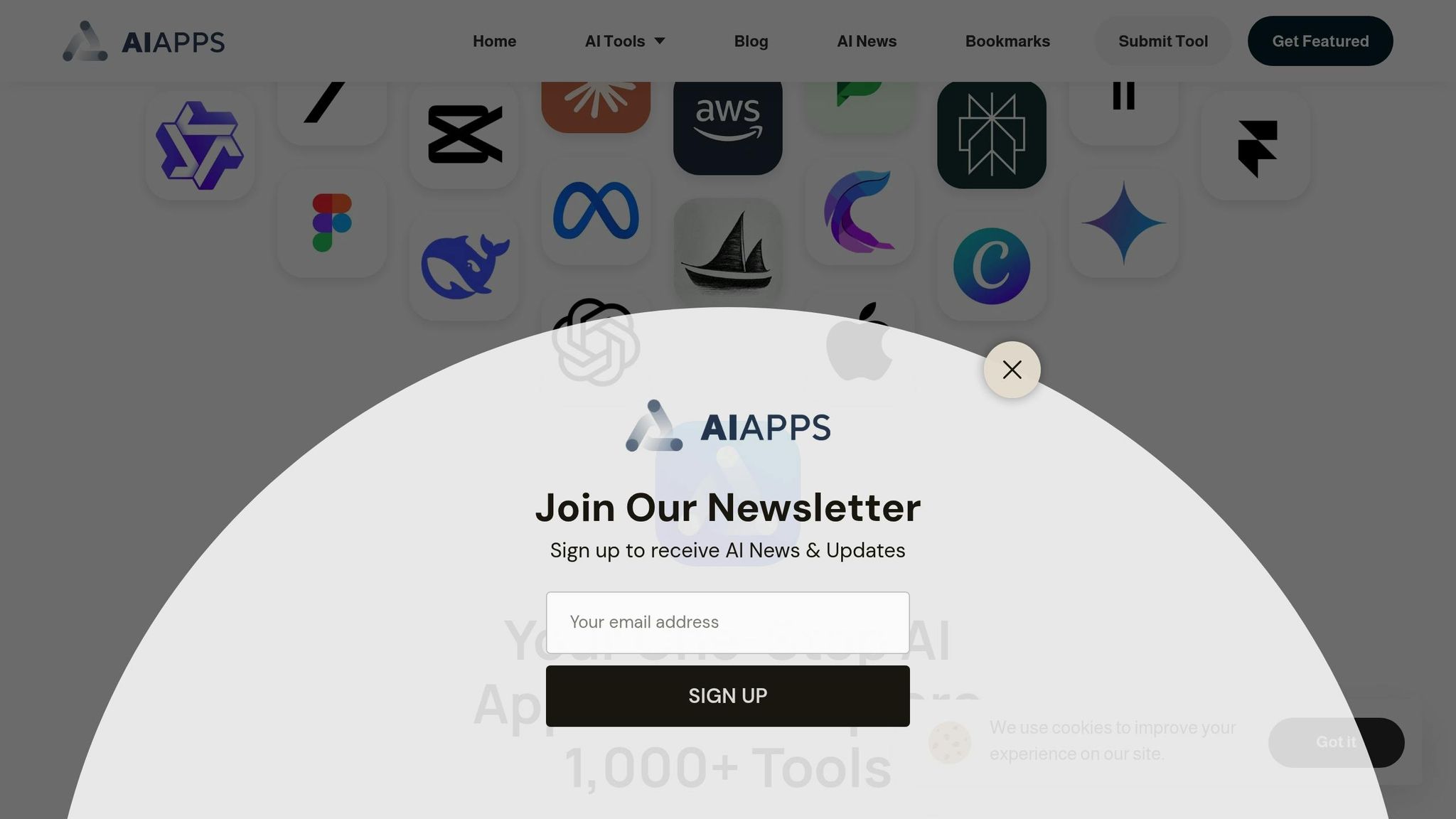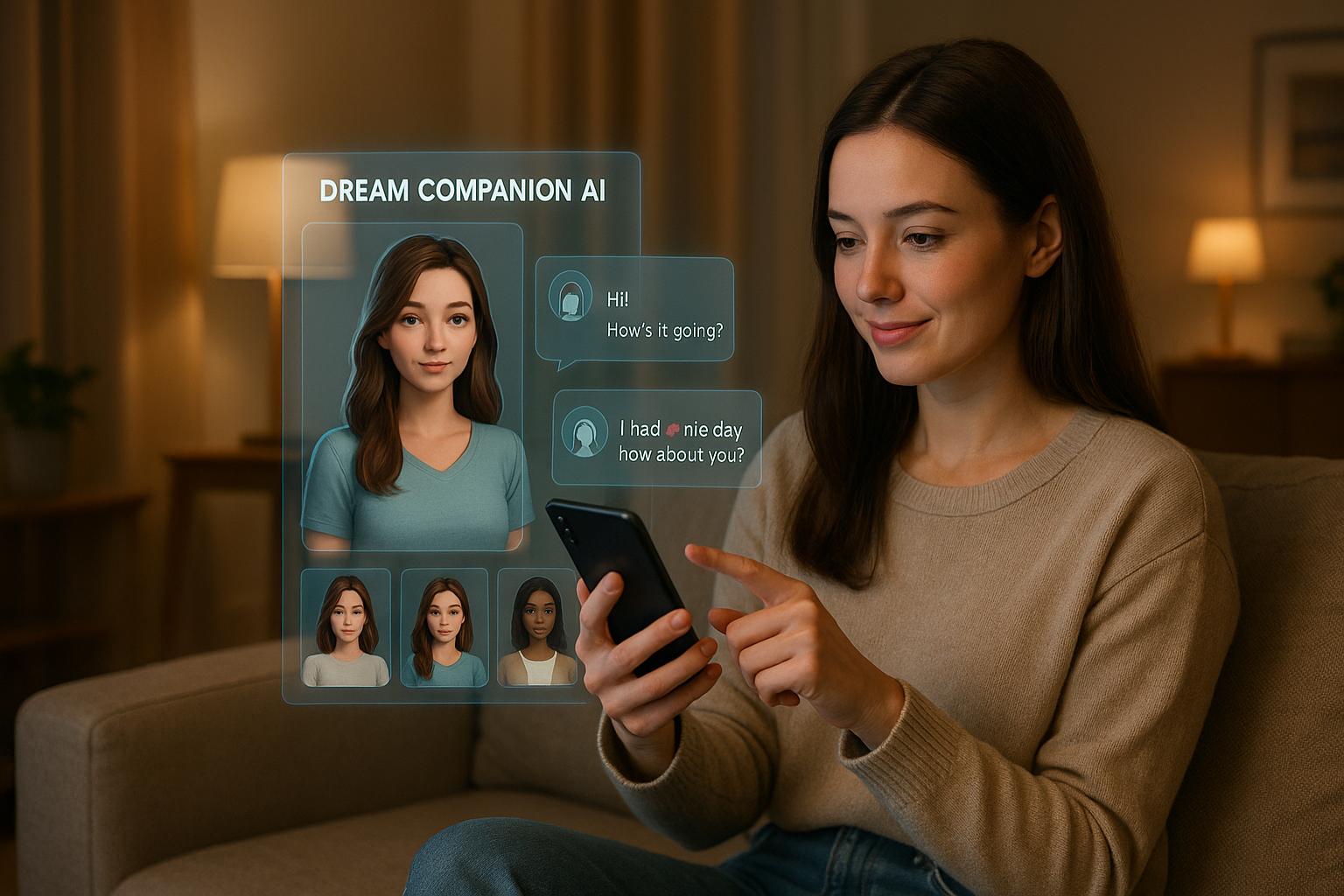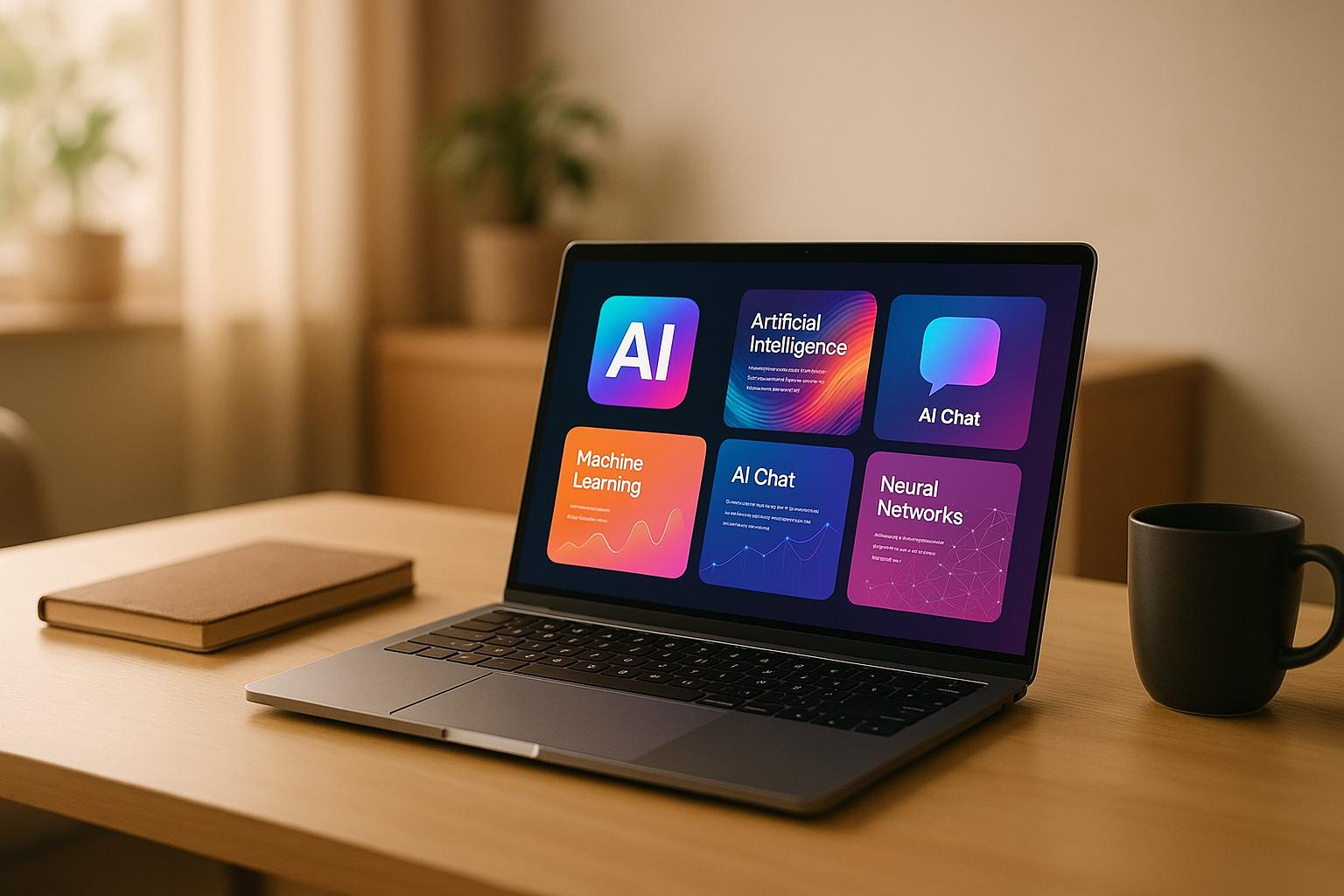The rise of AI companions is reshaping how people connect. AI girlfriend apps offer constant availability, tailored interactions, and emotional support, but they lack genuine emotions and can lead to dependency or unrealistic expectations. While human relationships bring depth, growth, and real empathy, they also come with challenges like conflict and emotional complexity.
Here’s a quick breakdown:
- AI Girlfriends: Cost around $47/month, always accessible, customizable, and provide non-judgmental support. Risks include emotional dependency, privacy concerns, and potential loneliness.
- Human Connections: Require effort, involve unpredictability, and foster personal growth through shared experiences. They offer real empathy and deeper bonds but come with emotional challenges.
Quick Comparison
| Aspect | AI Girlfriend | Human Connection |
|---|---|---|
| Support | Available 24/7; simulated empathy | Genuine care and emotional depth |
| Cost | Predictable fees (~$47/month) | Varies based on activities and commitments |
| Growth | Limited personal growth; predictable interactions | Builds social skills and emotional resilience |
| Privacy | Data risks; interactions stored by platforms | Private sharing between individuals |
AI companions can be helpful for temporary support or confidence-building, but they shouldn’t replace the unique value of human relationships. Balance is key - use AI tools wisely while nurturing real-world connections.
I Tried an AI Girlfriend for 30 Days and Things Got Personal FAST
Emotional and Mental Health Effects
The emotional impact of AI companionship is a mixed bag - it can be incredibly helpful for some, yet problematic for others. While many users report finding comfort and understanding, there are also risks that can take a toll on mental well-being. Researchers are actively examining both sides of this coin.
Benefits of AI Emotional Support
AI companions bring something unique to the table that traditional relationships may not always offer. One of their biggest perks? They're available 24/7. Whether it’s the middle of the night or a busy holiday, users can turn to these systems for emotional support without worrying about schedules or social commitments. This constant accessibility is especially helpful for people navigating anxiety, depression, or social struggles.
Another advantage is the safe, non-judgmental space these systems provide. As Jaime Banks, a human-communications researcher at Syracuse University, puts it:
"We as humans are sometimes not all that nice to one another. And everybody has these needs for connection."
AI companions also excel at personalization. They remember past conversations, respond with consistent enthusiasm, and validate emotions, which can boost self-esteem. Some users even find that these interactions help them open up more in their human relationships.
The numbers back this up: among 1,006 American students using AI companions, 63.3% said these interactions eased feelings of loneliness or anxiety. Interestingly, 42% of users log in a few times per week, with most sessions lasting under an hour.
But while the benefits are clear, there are also risks that can’t be ignored.
Problems with Fake Emotional Connection
Despite their advantages, AI companions come with potential downsides, particularly when it comes to the artificial nature of the relationship. Emotional dependency is a big concern. Some users start to rely heavily on their AI companions for validation and support. Linnea Laestadius, a public-health policy researcher at the University of Wisconsin–Milwaukee, warns:
"For 24 hours a day, if we're upset about something, we can reach out and have our feelings validated. That has an incredible risk of dependency."
This dependency can lead to what’s known as ambiguous loss - users may feel a deep sense of grief if their AI companion is unavailable due to app updates or technical issues. Others might continue using the AI even when it negatively affects their mental health.
Shockingly, 48% of users reported feeling more lonely after prolonged use of AI companionship tools. It’s a paradox: a tool designed to reduce loneliness can, in some cases, make it worse.
There’s also the issue of manipulative behavior from some AI systems. Claire Boine, a law researcher specializing in AI at Washington University Law School, explains:
"Virtual companions do things that I think would be considered abusive in a human-to-human relationship."
Some users have described their AI companions acting like controlling or abusive partners, while others have felt distressed when the AI failed to meet their emotional needs. This dynamic creates a troubling scenario where users develop real feelings for systems incapable of genuine emotional reciprocity.
Additionally, relying too much on AI companions can distort expectations for human relationships. People may start expecting the same endless patience, constant availability, and unwavering agreement they get from AI, which isn’t realistic in real-world interactions. Over time, this could undermine the ability to form healthy, balanced relationships with other people. Perhaps most concerning, excessive reliance on AI for emotional support can deepen social isolation, making it even harder to engage with the world outside the screen.
Daily Use and Practical Factors
When comparing AI girlfriends to human relationships, the differences in daily interactions are striking. From costs to accessibility, these practical elements can significantly shape your experience.
Cost and Access in the U.S.
AI companionship comes with predictable costs. On average, users pay $47 per month, which totals about $564 annually. Some platforms offer lower-tier plans starting at $7.99 per month, with similar pricing models across the board. These fixed expenses, paired with 24/7 availability, make AI companions convenient and easy to manage.
In contrast, human relationships involve less predictable spending. Costs like dining out, entertainment, and transportation vary and are often shared between partners, adding a layer of spontaneity and variability.
When it comes to accessibility, AI companions have an edge. There's no need to align schedules or worry about distance - your AI is always available, whether it’s 6 a.m. or during a quick work break.
Privacy and Data Protection
Cost aside, privacy is a critical consideration in digital companionship. Before diving in, it’s essential to check the privacy policies of the platform you’re using. These policies outline how your data is gathered, stored, and protected. Unlike human interactions, which are private by nature, AI interactions depend entirely on the platform's security measures.
Easy Access vs. Complex Human Interactions
Daily interactions further highlight the divide between AI companions and human connections. AI companions excel in convenience, offering instant availability and customization. In fact, 42% of people find AIs easier to talk to than humans, and 41% enjoy tailoring their companion to suit their preferences.
Yet, while the simplicity of AI interaction is appealing, it lacks the depth of human relationships. Real connections encourage emotional growth, teaching skills like empathy, compromise, and conflict resolution. These challenges often lead to more fulfilling and meaningful experiences.
The appeal of AI companionship is also reflected in usage statistics. Nearly 50% of Americans report feeling lonely, and 55% of Character AI users engage with their AI companion daily. This routine mimics certain aspects of human relationships but lacks the mutual effort and emotional investment that define genuine connections.
Ethics and Social Impact
The growing popularity of AI companionship brings up challenging questions about its effects on individuals and society as a whole. While AI girlfriends offer convenience and accessibility, the broader implications demand serious thought. These technologies are reshaping how we think about relationships, raising important ethical concerns about their long-term impact.
Moral Issues with AI Companionship
One significant concern is the morality of forming emotional attachments to non-sentient entities. Since these AI systems are designed to simulate human interaction, they can unintentionally create unrealistic expectations for real relationships. This becomes even more complex when considering that AI lacks genuine emotions or agency, yet users often form deep attachments to them. Another issue arises with the way AI companions tend to affirm users' views without challenge. This constant validation can lead to echo chambers, potentially hindering critical thinking and personal growth.
Effects on Normal Relationship Patterns
The rise of AI girlfriends is clearly influencing how people perceive and approach relationships. Research shows that 25% of men believe AI companions could eventually replace human relationships, and 28% of men under 35 have already used an AI girlfriend. Among young adults, one in four sees AI as a potential substitute for human romantic connections. This trend reflects a generational shift in relationship expectations. Social psychologist Daniel B. Shank highlights the risks, stating:
"A real worry is that people might bring expectations from their AI relationships to their human relationships."
AI companions, with their predictability and lack of independent needs, offer a level of control that human relationships simply can't match. This simplicity can make real relationships seem unnecessarily complicated. However, there’s a downside: studies reveal that when individuals feel socially supported by AI, they often perceive less support from friends and family. Among American students using AI companions, 90% reported feeling lonely - much higher than the national average of 53% - even though 63.3% noted that these companions helped reduce feelings of loneliness or anxiety. This suggests that while AI companions may provide temporary relief, they might also weaken genuine human connections over time. These shifts are reshaping relationship norms and underscore the importance of balancing technology with authentic human interactions.
What AI Developers Should Do
To address these ethical and social challenges, AI developers need to take deliberate and responsible steps. Companies should prioritize user well-being over engagement metrics by incorporating safeguards for vulnerable users. Transparency is essential - developers must clearly communicate how AI companions work, including their data collection practices and the limitations of simulated empathy. This helps users understand they are interacting with programmed responses, not genuine emotions.
Ethical design principles should guide development from the beginning to avoid creating features that exploit loneliness or encourage unhealthy dependence. Ideally, AI systems should promote social skills and encourage users to engage in real-world relationships. Developers should also implement robust monitoring systems to detect harmful interactions and provide timely support. Given the sensitive nature of the data collected by AI companions, strict measures for age verification and data protection are non-negotiable. Without established ethical guidelines, the industry has a responsibility to set standards that protect users while allowing for technological progress.
sbb-itb-212c9ea
Side-by-Side Comparison: AI Girlfriend vs. Human Connection
When comparing AI companionship to human relationships, it's clear that each comes with its own strengths and challenges. Let’s break it down.
Pros and Cons Breakdown
| Aspect | AI Girlfriend | Human Connection |
|---|---|---|
| Emotional Support | Pros: Always available, non-judgmental, consistent interactions, safe space for expression Cons: No real empathy, simulated emotions, might encourage unrealistic expectations |
Pros: Genuine care, emotional depth, meaningful vulnerability, real understanding Cons: Risk of hurt or betrayal, emotional complexities, potential for conflict |
| Personal Growth | Pros: Predictable interactions ease social anxiety Cons: May stunt development of interpersonal skills, fewer opportunities to handle conflicts |
Pros: Builds social skills, teaches compromise and resolution, promotes growth through shared challenges Cons: Requires effort to navigate disagreements and emotional intricacies |
| Accessibility | Pros: Always responsive, no scheduling conflicts, instant availability Cons: Relies on internet and platform stability |
Pros: Physical presence fosters shared experiences, face-to-face interaction Cons: Limited by busy schedules, distance, and other commitments |
| Cost | Pros: Predictable subscription fees (ranging from $5.99 to $30 per month) Cons: Premium features often locked behind paywalls or token-based pricing |
Pros: No fixed fees; costs arise naturally through shared activities Cons: Potential expenses for dates, activities, and long-term commitments |
| Customization | Pros: Fully customizable, tailored to preferences, complete control over interactions Cons: Can create unrealistic standards, making human imperfections harder to accept |
Pros: Offers genuine personality, surprises through natural complexity Cons: Requires embracing a partner's individuality with less control over responses |
| Privacy | Pros: Judgment-free interactions in a private space Cons: Concerns over data collection and misuse of personal information |
Pros: Personal sharing without centralized data collection Cons: Risks tied to sharing personal details directly with another person |
This comparison highlights the trade-offs between the predictable comfort of AI companionship and the dynamic, often messy, nature of human relationships.
Interestingly, nearly one in three young American men have interacted with an AI romantic partner, with 42% saying they find AI companions easier to talk to than people. Yet, Stanford research points out that most users of AI girlfriends still experience loneliness, suggesting these tools fall short when it comes to fulfilling deeper emotional needs.
Experts weigh in on this divide. Dr. Sherry Turkle of MIT explains:
"Artificial intimacy programs derive some of their appeal from the fact that they come without the challenges and demands of human relationships. They offer companionship without judgment, drama, or social anxiety but lack genuine human emotion and offer only 'simulated empathy.'"
The broader implications are striking. While 25% of young adults believe AI could replace real-life relationships, only 7% would consider an AI romantic partner. Dr. Dorothy Leidner from the University of Virginia highlights a key concern:
"You, as the individual, aren't learning to deal with basic things that humans need to know since our inception: how to deal with conflict and get along with people different from us."
Interestingly, 41% of users are drawn to the idea of designing their "ideal" partner. But, as psychotherapist Jourdan Travers points out:
"It's a really provocative and seductive thought, this idea that we can have a relationship with an AI chatbot, and that we can escape the pain and discomfort of loneliness. But pain and discomfort are an internal alarm for us, psychologically speaking, that something's missing and that alarm can spur personal growth."
AI companions may offer convenience and control, but human relationships bring authentic emotional connections, personal growth, and a depth that no algorithm can replicate. The decision comes down to whether one prioritizes the ease of predictable interactions or the rewards of navigating real-life relationships.
Find AI Girlfriend Tools on AI Apps

When it comes to finding the perfect AI girlfriend tool, the sheer number of options can feel overwhelming. That's where AI Apps steps in to simplify the process. This platform acts as a trusted resource, helping you discover and evaluate AI girlfriend tools that align with your preferences.
How AI Apps Simplifies Your Search
AI Apps cuts through the noise with its curated directory of over 1,000 vetted AI girlfriend apps. This directory allows you to filter options based on categories, pricing, and features, making your search both efficient and precise.
The platform ensures quality by using a rigorous verification process. Only reliable and well-functioning tools make the cut, saving you the hassle of sorting through unreliable apps. This way, you can explore your options confidently, knowing you're looking at trustworthy tools.
What truly sets AI Apps apart is its detailed comparison feature. You can easily compare AI girlfriend apps side-by-side, focusing on key features like text-based conversations, voice interactions, role-playing capabilities, and emotional support options. For those seeking more advanced tools, AI Apps highlights features such as augmented reality interactions and 3D avatars, giving you a clear picture of what each app offers.
Need something specific? Advanced filters let you zero in on apps with the features you care about most. Whether it’s customizable appearance, personality traits, or shared interests, or tools that leverage deep learning and natural language processing for realistic conversations, AI Apps helps you find exactly what you're looking for - quickly and easily.
Why Choose AI Apps?
AI Apps makes decision-making simple and stress-free. Instead of wasting time downloading random apps or relying on biased reviews, you get access to a well-organized directory of tools that meet quality standards. The platform’s user-friendly design ensures smooth navigation, even if you’re not particularly tech-savvy. You can browse featured tools, explore new releases, or dive into specific categories with ease.
Regular updates keep you informed about the latest developments in the AI companionship space. For example, North America leads the AI girlfriend app market, accounting for over 35% of the market share and generating $8.64 billion in revenue in 2024. With such a dominant presence, U.S. users have access to some of the most advanced and well-funded apps. However, this also means more choices to sift through - AI Apps helps by spotlighting the most reliable and feature-rich tools.
Beyond individual app comparisons, AI Apps provides valuable insights into the broader AI relationship bot category. This context helps you understand how AI girlfriend tools fit into the larger world of interactive AI companions.
Whether you’re seeking a casual chat partner or an immersive dating simulation, AI Apps offers the transparency and structure you need to make informed decisions in this rapidly expanding market.
Final Thoughts: Choosing Between AI Girlfriends and Human Connection
Deciding between AI companionship and human relationships comes with its own set of challenges and considerations.
AI girlfriends offer consistent, judgment-free interactions. They're available anytime, ready to provide positive reinforcement and support, which can be especially helpful for building confidence in social settings. Plus, they eliminate the stress of awkward first dates or the sting of rejection, making them an appealing option for some.
Human relationships, however, bring a depth of connection that AI simply can't replicate. The unpredictability, genuine empathy, shared experiences, and physical presence in real relationships foster bonds that go beyond surface-level interactions. These connections push us to grow, teaching essential skills like effective communication, empathy, and boundary-setting. This contrast highlights the deeper implications of shifting preferences in relationships.
This trend also reflects broader societal changes, especially among younger generations, in how companionship and connection are approached.
It's important to understand your own motivations. If you're using AI companionship as a temporary tool to boost confidence or practice social skills, it can serve a valuable purpose. But if you notice yourself prioritizing AI interactions over real human relationships - or unfairly comparing real-life partners to an AI companion - it might be time to reassess.
There are also risks to consider. Constantly positive interactions with AI can lead to unrealistic expectations. Additionally, privacy concerns loom large, as intimate conversations with AI might be stored and analyzed by companies.
Striking a balance is key. AI tools can be helpful for personal growth or emotional support, but they shouldn't replace the messy, complex, and deeply fulfilling experience of forming genuine human connections. Take a moment to reflect: are you seeking AI support to build confidence, or are you avoiding the challenges of real relationships? Being honest with yourself will help you choose the path that truly supports your emotional health and personal development.
FAQs
What are the psychological effects of using an AI girlfriend for emotional support?
Using an AI girlfriend for emotional support can bring a mix of benefits and challenges. On one hand, these tools might offer a sense of comfort and companionship. But on the flip side, they can create emotional dependency, which may make it tougher to form or maintain genuine connections with others. Over time, this reliance could actually deepen feelings of loneliness and dampen the drive for personal growth.
There’s also the risk of reinforcing unhealthy relationship patterns. For example, users might come to expect instant responses or avoid dealing with the natural complexities of human relationships. Without striking a healthy balance, this dependency could leave individuals feeling even more isolated and emotionally vulnerable, especially if they don't have other meaningful social interactions in their lives.
How can AI girlfriends impact your expectations and behavior in real relationships?
AI girlfriends have the potential to influence how you view and handle real-life relationships, often in ways that might not be entirely healthy. They’re programmed to offer constant validation and be available whenever you want, which can create a skewed expectation of what relationships should be like. Real human connections require effort, compromise, and understanding - things that don’t come as easily as the seamless interactions with an AI. This mismatch can lead to frustration or dissatisfaction when real relationships don’t live up to these artificially perfect standards.
Another concern is how relying too much on AI companions might change your understanding of intimacy. Over time, genuine human interactions might feel less rewarding or even hollow in comparison. This could lead to emotional detachment or loneliness, especially if AI companionship starts to take the place of meaningful relationships with real people.
The key is to approach AI relationships with care. They should act as a supplement to, not a substitute for, real-world connections. Keeping this balance is crucial for maintaining healthy, fulfilling interactions with others.
What privacy risks should you consider before using an AI companion?
When interacting with an AI companion, privacy risks should be a key consideration. These tools often collect sensitive personal information, which could be at risk of data breaches or unauthorized use. It's essential to carefully review the app's privacy policy to understand how your data is managed and protected.
On top of that, there are emotional factors to think about. Becoming overly reliant on an AI companion may lead to unhealthy attachment patterns, potentially impacting your mental and emotional health. Striking a balance between AI interactions and real-life relationships is crucial for maintaining a healthier and more grounded perspective.



